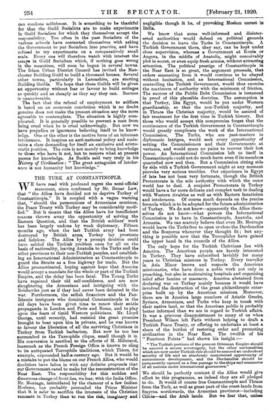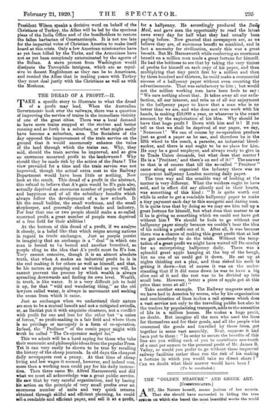THE TURK AT CONSTANTINOPLE.
WE have read with profound regret the semi-official statement, since confirmed by Mr. Boner Law, that " the Allies have decided not to deprive Turkey of Constantinople." It is coupled with a vague warning that, " should the persecutions of Armenians continue, the Peace Treaty with Turkey may be considerably modi- fied." But it means that the Allies have for insufficient reasons thrown away the opportunity of solving the Eastern Question, and that the British soldiers' work has been largely undone by weak diplomacy. Fifteen months ago, when the last Turkish army had been destroyed by British arms, Turkey lay prostrate and helpless. The Allies by a prompt decision could have settled the Turkish problem once for all on the basis of nationality, leaving Anatolia to the Turks and the other provinces to their non-Turkish peoples, and establish- ing an International Administration at Constantinople to guard the Straits as a free highway for trade. But the Allies procrastinated, hoping against hope that America would accept a mandate for the whole or part of the Turkish Empire, and the delay has been fatal. The Young Turks have regained their old self-confidence, and are now slaughtering the Armenians and intriguing with the Bolsheviks just as if they had never been defeated in the war. Furthermore, the selfish financiers and the Pan- Islamic intriguers who dominated Constantinople in the old days have been given time to renew their subtle propaganda in London and Paris and Rome, and to play upon the fears of timid Western politicians. Mr. Lloyd George, until recently, had resisted the great pressure brought to bear upon him in private, and he was known to favour the liberation of all the surviving Christians in Turkey from Turkish barbarism. But now he too has aucoumbed to the Turcophile clique, small though it is. ills conversion is ascribed to the efforts of M. Mdlerand, inasmuch as the French Foreign Office is known to cling to its antiquated Turcophile traditions, which Thiers, for example, expounded half-a-century ago. But it would be a mistake to put the blame on our French Allies, who would doubtless have fallen in with any definite proposals that our Government cared to make for the reconstruction of the Near East. The responsibility for this sudden and disastrous change of front lies, we fear, with the India Office. Mr. Montagu, intimidated by the clamour of a few Indian Moslems, has probably persuaded the Prime Minister that it is safer to sacrifice the interests of the Christian remnant in Turkey than to run the risk, imaginary and negligible though it be, of provoking Moslem unrest in India We know that some well-informed and disinter- ested authorities would defend on political grounds the decision to leave the Turks in Constantinople. A Turkish Government there, they say, can be kept under close supervision, whereas a Government at Boni& or Angora, in the middle of Anatolia, might conceivably plot in secret, or even equip fresh armies, without attracting attention. The political prestige of Constantinople in the Near East is so great, the argument proceeds, that orders emanating from it would continue to be obeyed without hesitation, and an International Commission, controlling the Turkish Government, would thus exercise. the maximum of authority with the minimum of friction. The success of the Publio Debt Commission is instanced in proof of this plausible doctrine. The assumption is that Turkey, like Egypt, would be put under Western guardianship, so that the non-Turkish majority, and Thrace the Christian majority, would be assured of fair treatment for the first time in Turkish history. But those who would accept this compromise forget that the continuance of the Turkish Government in Constantinople would greatly complicate the work of the International Commission. The Turks, who are past-masters in diplomatic intrigue, would seek every opportunity of setting the Commissioners and their Governments at variance, and would spare no pains to recover their lost rower. An International Commission left to itself in Constantinople could not do much harm even if its members quarrelled now and then. But a Commission sitting side by side with a Turkish Government might at any moment provoke very serious troubles. Our experience in Egypt of late has not been very fortunate, though the British Protectorate is the sole authority with which the outer world has to deal. A conjoint Protectorate in Turkey would have a far more delicate and complex task in dealing with Western rivalries as well as with Eastern fanaticism and intolerance. Of course much depends on the precise formula which is to be adopted for the future administration of Turkey. We do not know—apparently the Allies them- selves do not know—what powers the International Commission is to have in Constantinople, Anatolia, and Armenia. We can scarcely believe that even Mr. Montagu would leave the Turks free to open or close the Dardanelles and the Bosporus whenever they thought fit ; but any- thing is possible now that the Turcophiles have gained the upper hand in the councils of the Allies.
The only hope for the Turkish Christians lies with America. The American people are keenly interested in Turkey. They have subscribed lavishly for many years to Christian missions in Turkey. Every traveller in Asia Minor knows and respects the American missionaries, who have done a noble work not only in preaching, but also in maintaining hospitals and organizing relief after famine or massacre. America abstained from declaring war on Turkey mainly because it would have involved the destruction of the great philanthropic enter- prise built up by the American missions. Moreover, there are in America large numbers of Asiatic Greeks, Syrians, Armenians, and Turks who keep in touch with their native land, so that the American public is probably better informed than we are in regard to Turkish affairs. It was a grievous disappointment to many of us when President Wilson left Paris without helping to draft a Turkish Peace Treaty, or offering to undertake at least a share of the burden of restoring order and promoting civilization in the Near East. The twelfth of his " Fourteen Points " had shown his insight :— "The Turkish portions of the present Ottoman Empire should be assured a secure sovereignty, but the other nationalities which are now under Turkish rule should be assured an undoubted security of life and an absolutely unmolested opportunity of autonomous development, and the Dardanelles should be permanently opened as a free passage to the ships and commerce of all nations under international guarantees."
We should be perfectly content if the Allies would give effect to this programme, as indeed they are all pledged to do. It would of course free Constantinople and Thrace from the Turk, as well as great part of the coast-lands from Smyrna northwards, the Armenian provinces--ineluding Cilicia—and the Arab lands. But we fear that, unless President Wilson speaks a decisive word on behalf of the Christians of Turkey, the Allies will be led by the specious pleas of the India Office and of the bondholders to restore the fallen barbarian of Constantinople. It is not too late for the impartial voice of Christian America to make itself heard at this crisis. Only a few American missionaries have as yet been killed by the Turks, and the Armenians have not as yet been completely exterminated by the agents of the Sultan. A stern protest from Washington would dissipate the Turcophile intrigues, which are as repul- sive to decent Englishmen as they can be to Americans, and remind the Allies that in making peace with Turkey they must deal justly with the Christians as well as with the Moslems.



































 Previous page
Previous page